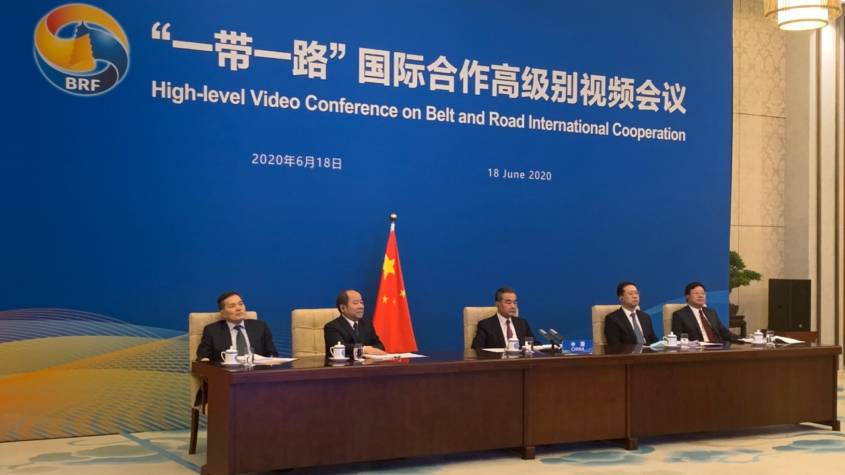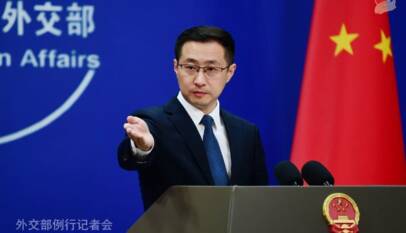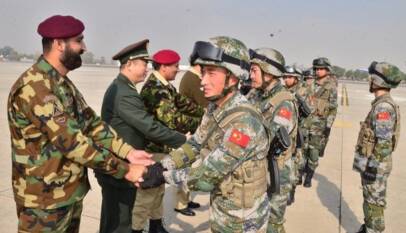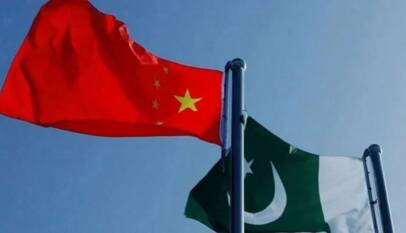High-level video conference on BRI endorse commitment to inclusive socio-economic development
High-level Video Conference on Belt and Road International Cooperation held in Beijing under the theme of “Belt and Road International Cooperation: Combating COVID-19 with Solidarity” on 18 June 2020. The BRI partners in a joint statement have acknowledged COVID-19 as a global pandemic that needs a global integrated humanitarian response. They agreed to promote international cooperation to address the menace of COVID-19 via capacity building of the public health system, coordinated research, knowledge and experience sharing. They ensured to enhance the equitable availability, accessibility and affordability of health products. The joint statement ensured commitment to implement the consensus reached during the 2nd Belt and Road Forum for International Cooperation. Ministers from 25 countries, along with representatives from the United Nations and the World Health Organization, attended the online conference
Joint Statement of the High-level Video Conference on Belt and Road International Cooperation: Combating COVID-19 with Solidarity
2020/06/19
1. We, the foreign and other ministers of the Belt and Road cooperation partners*, held a video conference under the theme of “Belt and Road International Cooperation: Combating COVID-19 with Solidarity” on 18 June 2020. We welcome the participation of the Director-General of World Health Organization and the Administrator of the United Nations Development Programme.
2. The COVID-19 pandemic poses a serious threat to human health, safety and well-being as well as the socio-economic development of our countries and the world at large. Our first priority is to contain the spread of the virus, save lives and safeguard global public health. We offer our sincere condolences to the families and societies of the victims of the pandemic. We also express our gratitude and support to all frontline health-care workers, medical professionals, scientists and researchers as well as other essential workers around the world who are working under difficult and challenging conditions to deal with the pandemic.
3. The COVID-19 constitutes a global challenge that calls for global response based on unity, solidarity, mutual support and multilateral cooperation. We recognize the central role of the United Nations system in catalyzing and coordinating the comprehensive global response to control and contain the spread of COVID-19 as well as the efforts of Member States therein, and acknowledge in this regard the key leadership role of the World Health Organization.
4. We agree that there is no place for any form of discrimination, stigmatization, racism and xenophobia in our response to the pandemic.
5. Recalling the spirit and principles reflected in the Joint Communique of the Leaders’ Roundtable of the 2nd Belt and Road Forum for International Cooperation, we will continue our efforts in promoting international cooperation, including high-quality Belt and Road cooperation. Such equal cooperation will continue to be open, green and clean, based on extensive consultation, joint efforts, shared and mutual benefits, as well as pursuit of high-standard, people-centered and sustainable development.
Towards a Health Silk Road
6. We support mutual efforts in combating the COVID-19, and will cooperate to address, control and overcome the pandemic through the sharing of timely and necessary information, experiences and best practices for diagnosis and treatment of the COVID-19, strengthening and upgrading the capacity of public health system, promoting joint scientific research and international dialogues among health professionals, and providing assistance to countries in need. We encourage bilateral, regional and international mechanisms to jointly counter the COVID-19, where necessary.
7. We underscore that an equitable access to health products is a global priority. We are committed to enhancing the availability, accessibility and affordability of health products of assured quality, particularly vaccines, medicines and medical supplies, which are fundamental to tackling the pandemic. Along these lines, we welcome and appreciate mutual support and assistance offered among partner countries. We welcome the United Nations’ efforts to strengthen global humanitarian response depots, and welcome relevant countries to explore the possibility to set up regional reserve centers or units for rapid deployment of medical supplies or personnel. We believe that COVID-19 vaccines should be recognized as global public goods.
8. We call for investment in building sound and resilient health related infrastructures, including the development of telemedicine. We will provide necessary healthcare support for each other’s citizens affected by COVID-19 in our territories including the frontline health workers and those working for Belt and Road and other programmes within available national capabilities in line with respective national laws and regulations.
Boosting Connectivity
9. We believe that promoting global partnership on connectivity based on openness, transparency, and inclusiveness, provides an opportunity for all and will contribute to combating the COVID-19 pandemic, mitigating its impacts and promoting socio-economic recovery. We support comprehensive and multi-modal infrastructure connectivity and sustainable transport system. We encourage countries to enhance their air, land and sea links through interoperable and multi-modal transport. We recognize the importance of cross-border and trans-regional transport and logistic passages, which include land, air and sea routes as well as transport infrastructure projects, in delivering vital medical supplies, equipment, food, critical agricultural products, and other essential goods, securing supply chains and promoting international trade, and meeting the needs of people’s livelihood and economic development. We will cooperate to keep those passages open or resume operation as soon as the situation permits.
10. We reiterate our support to build high-quality, reliable, resilient and sustainable infrastructure, ensuring its viability, affordability, accessibility, inclusiveness and broad benefit over its entire life-cycle, and contributing to sustainable development of partner countries and the industrialization of developing countries.
11. We welcome efforts to resume, in an orderly and step-by-step manner, normal cross-border movement of people while strictly following necessary epidemic prevention and control measures. We support the efforts by countries in need to strengthen bilateral and multilateral cooperation, including through the establishment of relevant networks, such as the voluntary development of express passenger channels for cross-border flow of business personnel, professionals and technical experts involved in international development cooperation projects, and green passages for cross-border trade in goods at the earliest convenience. We encourage relevant measures which include but are not limited to communication and coordination on mutual recognition of health testing results and quarantine arrangements agreed among relevant ministries in respective countries.
Promoting Economic Recovery
12. We support a universal, rules-based, open, transparent and non-discriminatory multilateral trading system with WTO at its core. We call for stabilizing the regional and the global industrial chains and supply chains, ensuring the continued flow of goods, services and personnel, as well as assisting the industries and economies adversely affected by COVID-19. We also highlight the importance of fair competition and the protection of intellectual property.
13. Our measures to promote economic recovery particularly the orderly resumption of productive activities and re-connection of the global value chain, will draw upon the professional advice of the relevant international organizations including WHO, based on our efforts in combating the COVID-19 pandemic. In view of the global economic and social disruption caused by the COVID-19,it is important for countries to enhance cooperation in such areas as digital economy,health care industry and food security,and explore new sources of growth by promoting e-commerce,smart cities and other applications of digital technology, as well as the use of artificial intelligence and big data technology, helping narrow the digital divide while drawing on international good practices.
14. We support dialogues and exchanges in areas of major development strategies, plans and policies, including through the coordination between the Belt and Road Initiative and other national, regional and international development strategies, programmes or initiatives. We encourage and support business friendly policies, particularly for the micro, small and medium enterprises (MSMEs) and the vulnerable economic sectors. We also take note of the efforts of certain countries to gradually restore tourism while ensuring sufficient epidemic prevention and control measures. We emphasize the importance of strengthening cooperation in human resource development, education, vocational and professional training to build up the capacity of our peoples to better adapt to the challenges brought about by the COVID-19 pandemic. We remain committed to the implementation of the 2030 Agenda for Sustainable Development and the Paris Climate Change Agreement while giving due consideration to the special needs and requirements of the LDCs and LLDCs. We welcome the UN system’s continued support to the Belt and Road cooperation.
15. We welcome the G20’s initiative on suspension of debt service payments for the world’s least developed countries for promoting their economic recoveries and sustainable development.
Deepening Practical Cooperation
16. Building on the progress already made, we will move forward with our cooperation on economic and transport corridors, economic and trade cooperation zones and other Belt and Road practical cooperation, in accordance with respective national development agenda, to further boost economic growth, social development and the improvement of people’s livelihood.
17. We emphasize the importance of economic, social, fiscal, financial and environmental sustainability of projects. We call on all market players in the Belt and Road cooperation to respect corporate social responsibility and follow the principles of the UN Global Compact.
18. We will continue to implement the consensus reached during the 2nd Belt and Road Forum for International Cooperation together with other partners, and promote bilateral, trilateral and multilateral cooperation in areas such as development policy synergy, increased infrastructure investment, economic corridors, economic and trade cooperation zones, industrial parks, finance, trade, innovation and technology, maritime cooperation, business-to-business ties, people-to-people and cultural exchange. We encourage all parties to create an enabling business environment for trade and investment promotion and industrial cooperation.
19. We will advance our cooperation in a people-centered approach. We reiterate that promoting peace, development and human rights, mutually-beneficial cooperation, and honoring the purposes and principles of the UN Charter and international law are our common responsibilities; achieving strong, sustainable, balanced and inclusive growth and improving people’s quality of life are our common goals; creating a prosperous and peaceful world with shared future is our common aspiration.
* The following countries are represented by their foreign or other ministers at the video conference: the Republic of Belarus, the Kingdom of Cambodia, the Republic of Chile, the People’s Republic of China, the Arab Republic of Egypt, the Federal Democratic Republic of Ethiopia, the Hellenic Republic, Hungary, the Republic of Indonesia, the Republic of Kazakhstan, the Republic of Kenya, the Kyrgyz Republic, the Lao People’s Democratic Republic, Malaysia, Mongolia, the Republic of the Union of Myanmar, Nepal, the Islamic Republic of Pakistan, the Independent State of Papua New Guinea, the Republic of Serbia, the Republic of Singapore, the Republic of Tajikistan, the Kingdom of Thailand, the United Arab Emirates, the Republic of Uzbekistan. The Foreign Minister of the Russian Federation delivered a written statement.
CPEC’s Success Story: $25 Billion Invested Across 38 Completed Projects
ISLAMABAD: A total of 38 projects worth over $25 billion have been completed and 23 develo…












